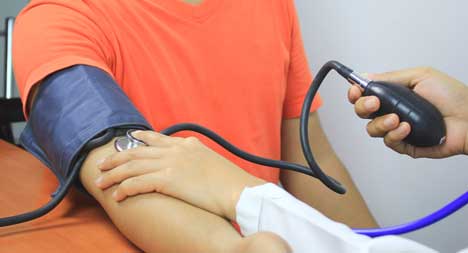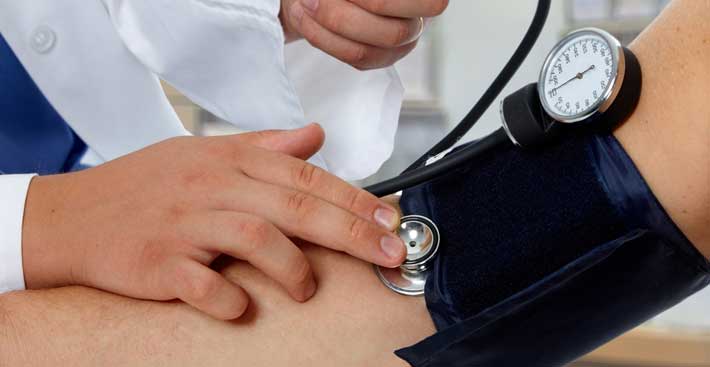High blood pressure (hypertension) can occur for many different reasons, some due to family history, race or age and other factors that a person has control of such as weight, diet and exercise. It is important to know the risk factors so the person can lower the risk of high blood pressure by simply making some lifestyle changes, check our expert reviews here.
Uncontrollable Risk Factors for High Blood Pressure

A person can develop high blood pressure as they age or because of family hereditary or race. As people age, high blood pressure becomes more common, especially in men. Women may develop high blood pressure after menopause. Because high blood pressure is a problem associated with aging, it is especially important to watch the diet and to exercise to decrease the risk.
Family history and race also contribute to the risk of developing high blood pressure. People who have a family history of high blood pressure are more likely to have it also. High blood pressure is also prevalent among the black population. Black people are more likely to develop high blood pressure at a younger age than white people. If a person knows they are more likely to develop high blood pressure, it allows them the opportunity to lower their risk factors, such as weight, diet and smoking, in order to lower the chance of developing the disease.
Controllable Risk Factors for High Blood Pressure
Many of the risk factors for high blood pressure can be eliminated either through diet, adding exercise, weight control or stress control. Simply living a healthier lifestyle can lower the risk of developing high blood pressure. Controllable risk factors include:

Diet – Eating a high-fat diet contributes to weight gain, another risk factor for high blood pressure. Too much salt in the diet is also unhealthy as it makes the body retain water, which increases blood pressure. Too little potassium can also be dangerous. Potassium helps to balance sodium in the cells and too little causes high amounts of sodium in the blood. Another risk factor is too little vitamin D. Although researchers aren’t entirely sure why, people with lower levels of vitamin D are more likely to have high blood pressure. The best way to lower the risk of high blood pressure is to eat a balanced diet rich in fresh fruits, vegetables, low-fat dairy products and whole grains and to eliminate high-fat foods. Also, limit the amount of processed foods, such as crackers, cookies and canned foods to lower the amount of sodium in the diet.
Weight – Being overweight can be a risk factor for high blood pressure. When a person is overweight, the body needs more oxygen and nutrients and the heart has to pump harder in order to supply the body with these necessities. Even losing a few pounds can make a difference in blood pressure. The weight on the scale may not be accurately telling the whole weight story, though. Experts now feel that waist size is a better measurement of weight than the scale. Women with a waist size of over 30 inches and men with a waist size of over 40 inches are considered to be overweight. Eating a balanced, healthy diet along with adding an exercise program is a good way to keep weight down and reduce the risk of high blood pressure.
Exercise – Exercise is important for weight control, lowering the heart rate and reducing stress. People who do not exercise are more likely to have a higher heart rate, which makes the heart work harder with each contraction. Exercise helps lower a person’s resting heart rate. Exercise also helps to lower stress and elevate mood. The American Heart Association suggests getting at least 2.5 hours of exercise each week and adding some strength training to the exercise routine.
Limit or Stop Unhealthy Habits – Using tobacco in any form or drinking alcohol can increase the risk of high blood pressure. Every time a person smokes, blood pressure raises temporarily. In addition, the chemicals in the cigarettes can cause damage to the artery walls, causing them to narrow and increase blood pressure. Alcohol also increases blood pressure by releasing hormones that increase blood flow and heart rate. People who are concerned about high blood pressure should stop smoking and limit alcohol consumption to no more than two drinks a day.

Stress – Chronic stress can increase blood pressure and cause damage the arteries. Many times, people who have high stress turn to smoking, drinking alcohol or overeating in order to calm their stress. The best way to calm stress is to begin an exercise program. It is also important to learn stress-relieving techniques to help lower stress in the moment. Taking deep breaths or walking away from the stressful situation for even five minutes before returning to it can help to lower the heart rate. Lowering risk factors for high blood pressure is important for overall health. High blood pressure can lead to damaged arteries, heart attack or stroke, so it is important to learn ways to reduce the risk of developing it. By lowering the risk factors, a person can lower their risk of developing high blood pressure now and as they grow older.
